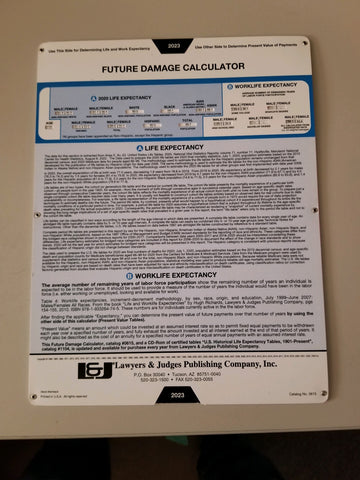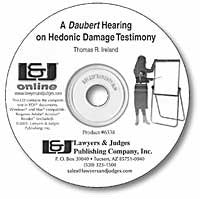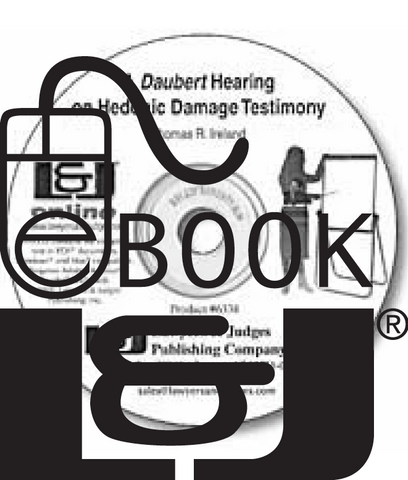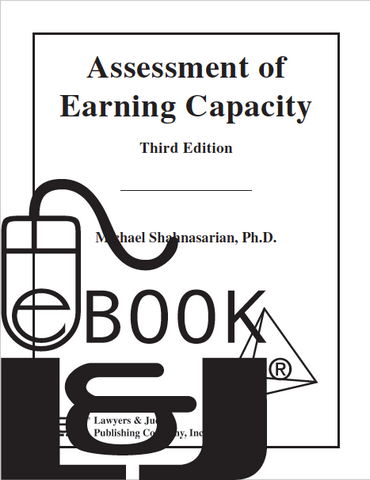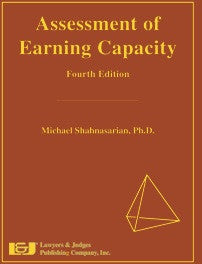
Assessment of Earning Capacity, Fourth Edition
-
Author: Michael S. Shahnasarian Ph.D.
-
ISBN 10: 1-936360-35-7
-
ISBN 13: 978-1-936360-35-2
-
Copyright Date Ed: October 06, 2014
-
Pages: 352
-
Binding Information: Casebound
- Size: 8.5 X 11 Inches (US)
Earning capacity is quite often underappreciated and not fully understood. All too often in litigated disputes, two vocational evaluators arrive at radically disparate opinions despite having similar professional backgrounds and analyzing the same set of facts. Who is the jury or judge to believe?
In Assessment of Earning Capacity, author Michael Shahnasarian, Ph.D. recommends standardization, objectivity, and consistency in vocational evaluations. He begins by introducing you to vocational expert services, guiding you through consultation and the standard methods to determining your clients' earning capacity. From there you will be taken through several comprehensive case studies examining common situations that may require vocational assessment, such as personal injury cases, family law, employment law, and an all new chapter on long term disability insurance. Finally, the author presents tips on appearing as an economic expert in court. You will learn what is required for trial preparation, testimony, and be presented with sample deposition questions and tips to aid you in presenting a professional demeanor while undergoing intense cross examination.
Assessment of Earning Capacity contains many examples to help you understand the expert's job.
This fourth edition has been extensively revised and contains revamped case studies.
Topics Covered:
- Vocational expert consultation
- Assess the value of earning capacity claims
- Investigate the integrity of vocational expert assessments
- Gain insight into the assessment process
- Methods of inquiry
- Career development potential
- Transferable skills
- Rehabilitation psychology
- Vocational rehabilitation surveys
- Client interview forms
- Sample clinical interview
- Earning Capacity Assessment Form
- Examine the validity of opposing experts' opinions
- How to present vocational opinions
Table of Contents
Preface
Part I Foundation Issues
Chapter 1: Vocational Expert Consultation
1.1 Vocational Expert Consultation
A. Matters Involving Acquired Disabilities
B. Claims Related to the Americans with Disabilities Act
C. Employment Law Disputes
D. Family Law
E. Long-Term Disability Insurance
F. Other Matters Involving Vocational Opinions
1.2 Vocational Expert Services
A. Scope of Involvement
B. Responding to Vocational Questions
1.3 Bases for Earning Capacity Opinions
A. Analysis of Existing Evidence
B. Development of New Evidence
C. Formulating an Opinion
1.4 Selecting a Vocational Expert
1.5 Conclusion
Chapter 2: Logistical and Contextual Considerations
2.1 Litigation Phases and Expert Involvement
A. Presuit Phase
B. Discovery Phase
C. Trial Phase
2.2 Administrative Issues
2.3 Expert Retention
2.4 Maintaining an Examination’s Integrity
2.5 Video Recording of Examinations
2.6 The Litigation Environment
2.7 Conclusion
Appendix 2.1: Sample Retention Letter
Appendix 2.2: Sample Retention Agreement
Appendix 2.3: Sample Letter Regarding Covenants Binding Evaluatiors in Transmitting Standardized Tests and Related Information
Appendix 2.4: Sample Court Order Specifying Scope of Vocational Rehabilitation
Appendix 2.5: Position Statement on Recording Rehabilitation Evaluations
Appendix 2.6: Memo to file
Chapter 3: Expert Evidence
3.1 Expert Evidence
3.2 Methodologies for Evaluating Claims of Loss of Earning Capacity
3.3 Presenting Expert Evidence
A. Consulting Experts
B. Testifying Experts
C. Expert Interrogatories
D. Affidavits
E. The Vocational Rehabilitation Report
F. Deposition and Trial Testimony
3.4 Conclusion
Appendix 3.1: Example of Expert Interrogatories
Appendix 3.2: Example of a Judge’s Ruling on the Scope of a Vocational Expert’s Test Administration
Chapter 4: Processes Undergirding the Assessment of Earning Capacity
4.1 Introduction
4.2 Assessment of Earning Capacity
A. Records Review
B. Subject Examination
1. Clinical interview
2. Administration of standardized tests
C. Labor Market and Associated Research
D. Consultations and Collateral Sources of Information
1. Family members, significant others, and caregivers
2. Employers
3. Case managers
4. Other experts
4.3 Conclusion
Appendix 4.1: Sample Letter Addressing Copying Costs and Associated Logistics
Appendix 4.2: Client Intake Form
Appendix 4.3: Sample Clinical Interview
Chapter 5: Earning Capacity and Loss of Earning Capacity
5.1 Introduction
5.2 Postulates Undergirding the ECAF-2
5.3 Factors Affecting Career Development and Earning Capacity
A. Inhibitors
1. Inhibitor 1: Phase of career development
2. Inhibitor 2: Subject-specific issues
3. Inhibitor 3: Ability to apply prior skills
4. Inhibitor 4: Future career development prospects
5. Inhibitor 5: Prognosis
6. Inhibitor 6: Need and capacity for retraining
7. Inhibitor 7: Preexisting vocational handicaps
8. Inhibitor 8: Acquired vocational handicaps
9. Inhibitor 9: Vocational adjustment issues
B. Drivers
1. Driver 1: Stability of career development
2. Driver 2: Work propensity
3. Driver 3: Demonstrated earnings history
4. Driver 4: Career motivation
5. Driver 5: Cognition
5.4 Assessing Effect on Earning Capacity
A. The Earning Capacity Assessment Form-2 (ECAF-2)
1. Overview of Earning Capacity Assessment Form Validity Studies
2. Overview of Earning Capacity Assessment Form Reliability Studies
B. Guidelines for Assessing Present and Future Loss of Earning Capacity
C. Factor Analysis Approach to Assessment of Earning Capacity: Three Examples
1. Example one: Head injury to a previously college-bound seventeen-year-old
2. Example two: Construction worker with orthopedic injuries from industrial accident
3. Example three: Psychological injury to mid-life professional
D. Unconventional and Questionable Approaches to Assessment of Earning Capacity: Three Examples
1. Example one: Failure to develop a full vocational profile
2. Example two: Computing earning capacity loss on the basis of theoretical loss of job accessibility
3. Example three: Overreliance on selected statistical data of little value
5.5 Conclusion
Part II Conducting Vocational Assessments
Chapter 6: Assessment of Earning Capacity in Cases of Acquired Disabilities
6.1 Introduction
6.2 Central Vocational Questions
A. Preincident (Injury) Earning Capacity and Skills
B. Residual Functional Capabilities and Limitations
C. Transferable Skills, and Need and Capacity for Retraining
D. Costs of Retraining
E. Presence of Acquired Vocational Handicaps
F. Postincident (Injury) Earning Capacity
G. Loss of Earning Capacity
H. Mitigation
I. Future Rehabilitative Needs
6.3 Noteworthy Considerations
A. Divergent or Disparate Medical Opinions
B. Current Employment and Projections of Future Earning Capacity Loss
6.4 Conclusion
Appendix 6.1: Sample Life Care Plan
Appendix 6.2: Vocational Rehabilitation Evaluation
Chapter 7: Assessment of Earning Capacity in Cases Involving the Americans with Disabilities Act
7.1 Introduction
7.2 Central Vocational Questions
A. Essential Job Functions
B. Reasonable Accommodations
7.3 Back Pay and Front Pay
7.4 Noteworthy Considerations
7.5 Conclusion
Appendix 7.1: Vocational Rehabilitation
Appendix A
Chapter 8: Assessment of Earning Capacity in Employment Law Cases
8.1 Introduction
8.2 Central Vocational Questions
A. Disruption of Career Development
B. Back Pay and Front Pay
C. Mental Distress Damages
8.3 Noteworthy Considerations
A. Notice Extended to Affected Employee
B. Mitigation
C. Severance pay
D. Outplacement
E. Entitlement Sentiments
F. Postseverance Vocational Behavior
8.4. Conclusion
Appendix 8.1: Vocational Evaluation
Chapter 9: Assessment of Earning Capacity in Family Law Cases
9.1 Introduction
9.2 Central Vocational Questions
A. Earning Capacity Determination
B. Retraining Considerations
9.3 Noteworthy Considerations
9.4 Conclusion
Appendix 9.1: Vocational Evaluation
Chapter 10: Assessment of Earning Capacity in Cases of Long-Term Disability Insurance
10.1 Introduction
10.2 Central Vocational Issues
A. Ability to Pursue Own Occupation
B. Ability to Pursue Any Occupation
10.3 Noteworthy Considerations
10.4 Conclusion
Appendix 10.1: Vocational Evaluation
Part III Forensic Practice Issues
Chapter 11: Testimony
11.1 Introduction
11.2 The Trial Environment
11.3 Trial Preparation
A. Reviewing Written Reports
B. Reviewing Deposition Testimony
C. Reviewing Extant Records and File Materials
D. Analyzing New Records Generated After a Previous Examination or File Review
E. Conducting an Update Examination
F. Conducting Updated Labor Market Research
G. Consulting with Other Experts
H. Preparing Trial Exhibits
I. Consulting with Attorney About Direct Examination
11.4 Pretrial Conference
11.5 Depositions of Testifying Experts
11.6 Testifying at Trial
A. Direct Examination
B. Cross-Examination
C. Redirect Examination
D. Trial Exhibits
1. Exhibits from extant records and information
2. Exhibits developed by the expert
11.7 Conclusion
Appendix 11.1: Sample Proposed Direct Examination Questions for a Vocational Expert
Appendix 11.2: Sample Scheduled Deposition Letter
Chapter 12: Case Studies
12.1 Introduction
12.2 Case Study 1
12.3 Case Study 2
12.4 Case Study 3
12.5 Conclusion
Bibliography
About the Author
Index

